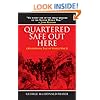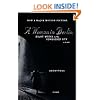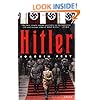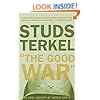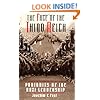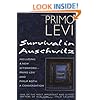



Not I: Memoirs of a German Childhood Paperback – February 11, 2014

Don't have a Kindle? Get your Kindle here, or download a FREE Kindle Reading App.
Product Details
Would you like to update product info or give feedback on images?.
|
Editorial Reviews
Review
“The socially conformist thing to do for a man of distinction—journalist, filmmaker, author of the best-selling first postwar German biography of Hitler, eventually co-editor of the Frankfurter Allgemeine Zeitung—would have been to recount the history of his own distinguished career. Instead Joachim Fest (1926-2006) chose to write Not I, a colorful and dramatic account of his childhood and youth in the nonconformist family that made him what he became.” —The Wall Street Journal
"Quietly compelling, elegantly expressed… Not I shrinks the Wagnerian scale of German history in the 1930s and 1940s to chamber music dimensions. It is intensely personal, cleareyed and absolutely riveting.” —The New York Times
“Exceptional…it tells in a modest, believable, quietly bitter, and totally proud way of a family’s extraordinary decency…Strong and unique. Without it, the English language these days is short a very good book.” —New York Times (Global Edition)
“Joachim Fest’s fascinating memoir about what it was like to come of age during the years of the Third Reich is unusual because its central character is not the author but the author’s remarkable father.” —The New York Times Book Review
"Fest’s portraits of his brothers, his mother, and his cousins—and of himself as a teenage soldier and POW—are equally vivid and full of pathos." —Lorin Stein, The Paris Review
"[An] extraordinary memoir, written in a polished style full of irony and wit." —New York Review of Books
"A stunning portrait of a strenuously anti-Nazi family in Berlin who managed to hang on to their moral convictions during the brutalizing Hitler years...A beautifully written and translated work that creates rare, subtle portraits of Germans." —Kirkus Reviews (Starred Review)
"[An] extraordinarily humane addition to our understanding of those who acted heroically not alone, but alongside a few intimates, together facing into the void." —America Magazine
“A heroic interrogation of Germany’s past.” —Sunday Telegraph
“I loved it, both as a story of great personal courage but also as a very moving witness to the fact that decent liberal values were not entirely lost during the Nazi period. It gives a fascinating and unusual slant on a time that has been so heavily worked over in more obvious ways. In its own manner, it stands alongside Victor Klemperer’s extraordinary diaries of the same period.” —Simon Mawer, best-selling author of Trapeze and The Glass Room
“Fest’s accounts of being called up, of trying to avoid military service, fighting, seeing comrades die, and being caught and kept as a prisoner of war are engrossing.” —Independent On Sunday
“[Fest] makes it hard to think about those blighted years, and it should be hard. His book is a glory, but only if you dare.” —The Scotsman
About the Author
Joachim Fest was one of the most important authors and historians of the Federal Republic of Germany. From 1963 he worked as chief editor of Norddeutscher Rundfunk (North German Broadcasting), and from 1973 to 1993 as editor of the Frankfurter Allgemeine Zeitung. His biography Hitler (1974) has been translated into more than twenty languages. His other works include Inside Hitler’s Bunker (2005), Speer: The Final Verdict (2002), and Plotting Hitler’s Death (1996).
Herbert A. Arnold holds a PhD from the University of Würzburg and is a professor emeritus of German and Letters at Wesleyan University.
Martin Chalmers’s recent translations include Summer Resort by Esther Kinsky and Brussels, the Gentle Monster: or the Disenfranchisement of Europe by Hans Magnus Enzensberger. In 2004 he was awarded the Schlegel-Tieck Prize for The Lesser Evil, his translation of the post-1945 diaries of Victor Klemperer.
More About the Author
Customer Reviews
Most Helpful Customer Reviews
Joachim Fest (1926-2006) uses this quote toward the end of his engrossing memoir "Not I: Memoirs of a German Childhood" (Other Press, 464 pages, $15.95, trade paperback, photographs, index, translated from the German by Martin Chalmers, with an introduction by Herbert A. Arnold) to explain why he retained the conservative beliefs of his father in writing some of the best accounts of Hitler and Nazi Germany that have been published by any author. Many of the other writers on the subject approached it from a leftist perspective but Fest believed the Communists were as bad as the Nazis -- only they had better PR.
The quote from Thoreau appears on Page 409, in the part of the memoir that deals with his adult life -- a relatively short section compared with his experiences up to 1945 when he was captured by American troops near the Remagen bridge in western Germany.
Fest had joined the regular army -- the Wehrmacht -- to avoid being drafted into the Waffen S.S., he writes, much to the consternation of his father, who opposed the Nazi regime from the conservative spectrum of the Weimar Republic. His father said: "one does not volunteer for Hitler's criminal war."
His father, Johannes Fest, was dismissed from his teaching position in 1933, when Hitler was elected chancellor and night descended on Germany. The footnotes by the translator and Arnold explain the literary and cultural references in Fest's memoirs and are an invaluable addition to the book for the general reader.Read more ›
So this book is not so much about Joachim Fest per se, but is about the story of what he and his family went through and did to survive the war even as they rejected Hitler and his Nazism. Joachim and his brothers were sent to the eastern front; his sisters and mother were raped by the Russians as Germany was overrun, and he spent two years in an Allied internment camp.
The hero of this book is Joachim's father, Johannes Fest: who, as noted above, was a primary school headmaster, a cultural conservative who revered Goethe and Kant, a loyal German patriot, a fierce Weimar republican; a pious Catholic, and a father of five. It was his father that laid down a strong enough set of moral values that allowed them to see the coming moral and physical destruction that Adolph Hitler and his Nazi thugs and their debased racist ideology represented, and would wreak on German society and culture. Once they saw Hitler coming they braced themselves, prepared to weather the storm -- and in large part succeeded in efforts to survive through the war.Read more ›
This was an educated, upper middle class family. The text is filled with references to Goethe, Schiller, Kant and many lesser lights - the German basis of enlightenment. I found the many detailed accounts of family life a bit excessive. But then there is a passage that shows how Nazism impinged inexorably on the Fests. For example, they learned of the murders of Jews in Russia after the Russian invasion from soldiers returning from the Eastern Front.
They had to be careful of everyone they spoke to, as Fest Sr. explained to the two older boys, 10 and 12, one of whom was Joachim.
This is a fascinating account of a German childhood in the Third Reich and the treacherous ground upon which the family stood. The parents had Jewish friends, some of whom left suitcases of valuables with them which they buried in their backyard. Their friends, who beieved this too would pass, never returned after the war.Read more ›
